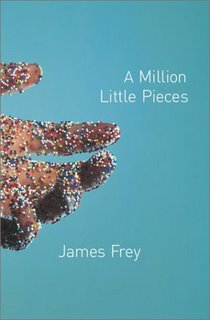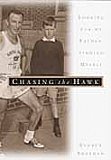
I remember seeing a really funny comic in Newsweek a couple weeks ago after the controversy developed over James Frey's novel A Million Little Pieces. The comic had a man going up to the counter at a book store asking where he could find a copy of the best selling novel. The employee at the book store answers "We have some in fiction and some in non-fiction."
It has been interesting to me to see how many
were so angered by the situation. And as a person who had not yet read the book, I found myself a little apethetic on the issue. But at the same time, I knew people that had read it, and for the most part the readers of the book were okay with the discoveries made by the Smoking Gun and wanted to ignore the fact that much of James Frey's Oprah-endorses memoir was a dramatic embellishment.
Yet, it is interesting to me because I think we are deeply attracted to the concept of "memoir" in our current society. We are desperatly seeking out truth because for many of us, time is too valuable to waste on fiction...unless of course we are looking for escape in fiction...in which case we may find the newest Harry Potter to be our cup of tea.
And it is at this juncture that I realize how thankful I am that I had not yet read Frey's work. I deeply appreciate both fiction and non-fiction. And even when I read or watch a film that is fictional I am curios as to what nuggets of personal truth may be included. (For example, I love Jim Sheridan's film In America, and knowing that he wrote the screenplay with his two daugters, I wonder what details of the story are more personal and real than I can imagine. And that is a magical feeling. Yet I was thinking of my favorite memoir, and have decided to share a little about it, because I think it is wonderfully candid and honest and think it is so wonderful, and I would be sad if significant falsity was exposed.
would be sad if significant falsity was exposed.
The memoir is called Chasing the Hawk by Andrew Sheehan. The novels subtitle is "Looking for my Father, finding Myself." And this is such a rich story because it tells a very humanistic story of a boy who grows up in a relationship very distant from his father, falls on hard times, and comes to reconcile much of that relationship with his father, even if much of that reconciliation is internal. Because it is a memoir there are nuggets of truth to digest all through out the book. You learn about family, alcholism (which Andrew Sheehan struggled with tremendously), you learn about New England, and you learn about running (Andrew's father Dr. George Sheehan really created the concept of running as a sport and is created with the old-school New York Times Best Seller Running and Being).
This is an awesome story, and because it is a memoir I read it differently, looking for common relatable experience and to learn about life. I'm not looking for literature devices such as foreshadowing and character arches, I'm looking for truth. And with such feelings it is sad to me that a largely embelished story as James Frey has written could be labeled and marketed as a true story.

1 comment:
I think we need to start a new life group blog-ring. I might post the links on my site today....
Post a Comment